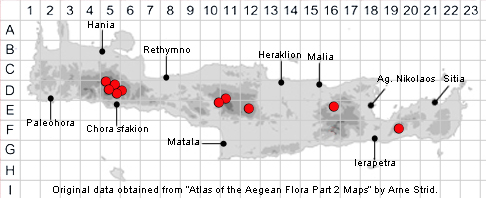SPECIES DESCRIPTION
EUPHORBIA HERNIARIIFOLIA
Family and Genus:- See- EUPHORBIACEAE/Subgen. ESULA/Sect. PARALIAS
Common Names:- None
Homotypic Synonyms:- Tithymalus herniariifolius
Meaning:- Euphorbia (L) For Euphorbus, physician to the King of Mauritania.
Herniariifolia (L) With leaves similar to Rupture-wort (Herniaria).
General description:- Glabrous or tomentose, somewhat glaucous perennial.
Stems:-
1) Up to 20 cm, numerous procumbent to ascending, forming dense mats,
much-branched but with no axillary rays.
Leaves:-
1) Cauline, 0·4-10 X 0·4-5 cm, orbicular to obovate-elliptical, subacute or obtuse,
entire; petiole up to 1·5 mm.
2) Ray- and raylet-leaves, very like the cauline.
Flowers:-
1) Rays, 2-3, not or once dichotomous, occasionally proliferating.
2) Glands, with 2 horns.
Fruit:-
1) Capsule, 3 x 3·5 mm, shallowly sulcate, smooth, with 2 wings on each keel,
glabrous or tomentose.
2) Seeds, 2 mm, cylindrical, irregularly and shallowly pitted, pale grey.
Key features:-
1) Capsule, winged.
2) Seeds, smooth, rugulose, tuberculate or indistinctly pitted.
Habitat:- Rock crevices, rocky slopes and screes, especially on limestone,
occasionally other substrates. (700-)1000-2200.
Distribution:- Limited distribution throughout the Mediterranean. Limited distribution
on Crete. Restricted to the massifs at over 1400m.
Flowering time:- Apr-June.
Photos by:- Steve Lenton
Protection status (for threatened species): Greek Presidential Decree 67/1981
